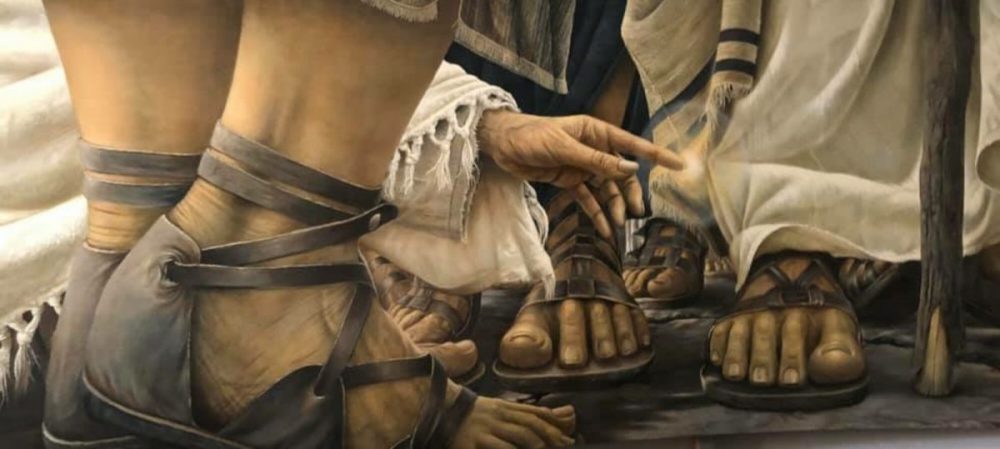In Genesis 22 we read the familiar story of Abraham offering his son, Isaac, as a sacrifice in obedience to God’s command. We know how Abraham, Isaac, and two young men traveled three days to the land of Moriah. As they approach the mountain, Abraham and Isaac leave the young men and go up the mountain alone with the wood and the fire. Isaac, of course, asks his father where the animal for the sacrifice was, and Abraham responds by saying that “God will provide for himself the lamb for the burnt offering” (Gen. 22:8).
At the top of the mountain, Abraham builds the altar, lays the wood on the altar, binds Isaac and lays him on the wood, then raises the knife to slay his son. Of course, God stops him, Abraham sees the ram caught in the thicket by his horns, and they sacrifice the ram instead of Isaac. Following this, the angel of the Lord calls to Abraham, and the words he says I believe are significant, not only for Abraham but also for us.
The angel says, “By myself I have sworn, declares the LORD, because you have done this and have not withheld your son, your only son, I will surely bless you, and I will surely multiply your offspring as the stars of heaven and as the sand that is on the seashore. And your offspring shall possess the gate of his enemies, and in your offspring shall all the nations of the earth be blessed, because you have obeyed my voice” (Gen. 22:16-18).
The blessings mentioned in these verses are part of the covenant blessings God made with Abram earlier (Gen. 12:1-3; 15:1-5), but it appears that the promised blessings were conditioned upon Abraham obeying God’s command. Is it possible that, though God gave Abraham the promise, he would not have received the fulfillment of that promise if he had not done what God asked him to do and offer Isaac as a sacrifice? Could God be testing Abraham’s faith to see if he would fully commit himself to God regardless of the cost? I believe the answer to both questions is, yes.
We know that Abraham did make a great step of faith when he left his family and homeland not knowing where he was going—only that God would show him (Gen. 12:1). However, there were moments when Abraham’s faith wavered. He showed a lack of trust in God when he asked Sarah to say she was his sister when they were in Egypt (Gen. 12:10-20). And he and Sarah did not show great faith when they tried to help God provide a son by having Abraham father a son through Hagar (Gen. 16:1-4). Then, both Abraham and Sarah laughed when God confirmed that they would give birth to a son (Gen. 17:15-17; 18:9-12).
It seems, however, that since the birth of Isaac, and Abraham saw the faithfulness of God to keep His promises, his faith grew to the point where he believed that God was even able to raise Isaac from the dead (Heb. 11:17-19). Abraham had grown to trust God so much that when God asked him to give up the son of promise, he was willing to obey because He knew God would somehow fulfill his covenant promise of a multitude of descendants through whom the nations of the earth would be blessed. He may not have understood why, but he trusted God which is why Abraham is called the father of our faith (Rom. 4).
So, what does that mean for us today? There are three points that I take from Abraham’s story. One is that faith is really a matter of trust. I think we have this idea that faith is simply saying the right words, making the right confession, or believing in something strong enough that it will happen. But faith comes out of our relationship with God. The closer we get to God and the better we know Him, the more we can trust Him. So, if we want to see our faith grow, we need to grow closer to God. The second point is that our faith does grow with experience. We are not going to start out as giants of the faith who can see amazing miracles happen right away. Like anything else, we begin trusting God for little things. Then, as we see that He keeps His promise in the small things, we will know that we can trust Him for bigger things. This is all part of building our relationship with Him. The third point is that obedience must accompany our faith. James says that faith without works is dead (James 2:14-26). I remember hearing a pastor say years ago that faith never stands around with its hands in its pockets. Faith is always demonstrated with action. If we have faith in God, we will do what He asks us to do even if, as with Abraham, we may not understand why. It is only when we put our faith into action and obey God that we will see the promises God has for us fulfilled. Only “because you have obeyed my voice” (Gen. 22:18).
